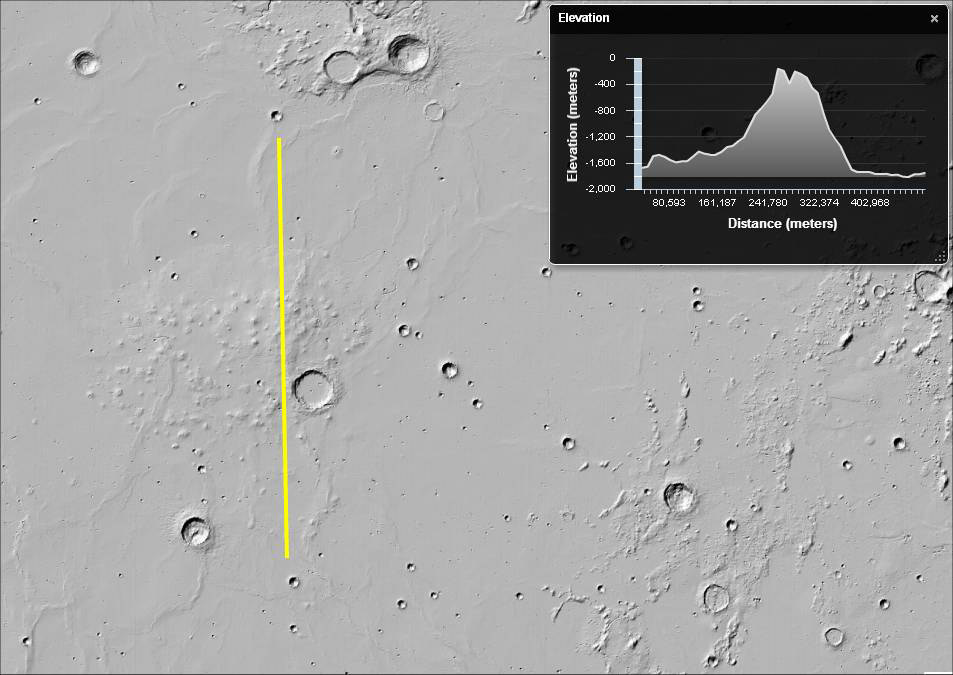Difference between revisions of "October 24, 2013"
| Line 6: | Line 6: | ||
<em>image by [mailto:Brian.H.Day@nasa.gov Brian H. Day], NASA Ames Research Center</em><br /> | <em>image by [mailto:Brian.H.Day@nasa.gov Brian H. Day], NASA Ames Research Center</em><br /> | ||
<br /> | <br /> | ||
| − | For years, professional and amateur observers of the Moon have been fascinated by the numerous, small lunar domes like those featured in the [https://the-moon.us/wiki/Marius_Hills Marius Hills]. Such observations inevitably led to the question, "Why are there no large volcanoes on the Moon?" Features like [https://the-moon.us/wiki/Mons_R%C3%BCmker Mons Rumker] and even the [https://the-moon.us/wiki/Gardner_megadome Gardner Megadome], while standouts among lunar volcanoes, are unspectacular compared to many larger volcanic edifices on Earth and Mars. But in 2011, Spudis et al pointed out the existence of what appear to be large shield volcanoes or [http://lpod. | + | For years, professional and amateur observers of the Moon have been fascinated by the numerous, small lunar domes like those featured in the [https://the-moon.us/wiki/Marius_Hills Marius Hills]. Such observations inevitably led to the question, "Why are there no large volcanoes on the Moon?" Features like [https://the-moon.us/wiki/Mons_R%C3%BCmker Mons Rumker] and even the [https://the-moon.us/wiki/Gardner_megadome Gardner Megadome], while standouts among lunar volcanoes, are unspectacular compared to many larger volcanic edifices on Earth and Mars. But in 2011, Spudis et al pointed out the existence of what appear to be large shield volcanoes or [http://www2.lpod.org/wiki/January_28,_2011 mega-megadomes] on the Moon associated, in many cases, with known clusters of smaller volcanic landforms. The extremely low slopes of these shields can make them very difficult to detect. But new tools, such as NASA’s [http://lmmp.nasa.gov Lunar Mapping and Modeling Portal] can reveal these subtle monsters. The mega-megadome upon which the Marius Hills sit is an excellent case in point. In the LMMP view featuring the LOLA DEM Hillshade layer, the Marius Hills themselves are quite evident, but the underlying shield certainly does not stand out. But in an elevation plot of the laser altimetry data along a transect from south to north, the Marius Shield becomes quite evident. Though the high vertical exaggeration makes it look like more of a cone than a shield in this plot, the Marius Shield with its cones on top of it does bring to mind a flatter version of the great shield of Mauna Kea here on Earth adorned with its multiple small cones clustered around its summit.<br /> |
<br /> | <br /> | ||
<em>[mailto:Brian.H.Day@nasa.gov Brian H. Day]</em><br /> | <em>[mailto:Brian.H.Day@nasa.gov Brian H. Day]</em><br /> | ||
| Line 12: | Line 12: | ||
<br /> | <br /> | ||
<strong>Related Links</strong><br /> | <strong>Related Links</strong><br /> | ||
| − | <em>[ | + | <em>[[21st Century Atlas of the Moon|21st Century Atlas]]</em> chart 22.<br /> |
<br /> | <br /> | ||
<p><b>Yesterday's LPOD:</b> [[October 23, 2013|Volcanic Drivers]] </p> | <p><b>Yesterday's LPOD:</b> [[October 23, 2013|Volcanic Drivers]] </p> | ||
Latest revision as of 08:35, 28 October 2018
More Volcano News

image by Brian H. Day, NASA Ames Research Center
For years, professional and amateur observers of the Moon have been fascinated by the numerous, small lunar domes like those featured in the Marius Hills. Such observations inevitably led to the question, "Why are there no large volcanoes on the Moon?" Features like Mons Rumker and even the Gardner Megadome, while standouts among lunar volcanoes, are unspectacular compared to many larger volcanic edifices on Earth and Mars. But in 2011, Spudis et al pointed out the existence of what appear to be large shield volcanoes or mega-megadomes on the Moon associated, in many cases, with known clusters of smaller volcanic landforms. The extremely low slopes of these shields can make them very difficult to detect. But new tools, such as NASA’s Lunar Mapping and Modeling Portal can reveal these subtle monsters. The mega-megadome upon which the Marius Hills sit is an excellent case in point. In the LMMP view featuring the LOLA DEM Hillshade layer, the Marius Hills themselves are quite evident, but the underlying shield certainly does not stand out. But in an elevation plot of the laser altimetry data along a transect from south to north, the Marius Shield becomes quite evident. Though the high vertical exaggeration makes it look like more of a cone than a shield in this plot, the Marius Shield with its cones on top of it does bring to mind a flatter version of the great shield of Mauna Kea here on Earth adorned with its multiple small cones clustered around its summit.
Brian H. Day
LADEE Mission E/PO Lead
Related Links
21st Century Atlas chart 22.
Yesterday's LPOD: Volcanic Drivers
Tomorrow's LPOD: All the Landings
COMMENTS?
Register, Log in, and join in the comments.



